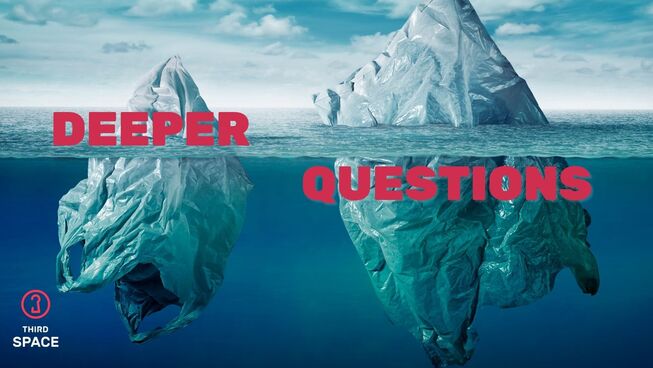'Nope-speed' demons

I love watching the Slow Mo Guys on YouTube. There is something so appealing about watching destruction at 28,500 frames per second. They spin an apple faster and faster until they find the apple’s ‘nope-speed’ of 6565 RPM and it disintegrates into fruit salad. Your eyes are glued to the screen as the apple spins towards inevitable destruction.
People too, have a ‘nope-speed’. And yet often we see the people around us spinning faster and faster under the pressures of work until their life falls apart in slow motion.
Treating half the problem
Over the last 12 months over 50% of Australian workers reported feeling burnt out. Burnout is nothing new, but the pandemic has intensified the problem.
I was a young English language teacher in the UK when I first experienced burnout at work. A colleague tried to help by giving me a book on resilience. I scanned through the contents page searching for a chapter about asking for a reduction in your workload. Nothing.
This was frustrating: the problem wasn’t my lack of resilience – the problem was that there was too much work to do in too few hours.
Burnout has been a well-studied phenomenon for decades but somewhere along the way we all somehow forgot that self-care is only 50% of the treatment. If you are like most people, you do not have control of your workload. Your boss or the HR department control your life at work and with that control comes a responsibility to care for your wellbeing.
Counterproductive resilience
You can choose to develop resilience as your personal superpower, but if your employer is not collaborating with you then you are sending the wrong message. You are telling the employer that they can turn up the abuse to eleven and you will happily accommodate the abuse.
An HR department won’t necessarily recognise the discretionary effort that you put in. They will just see that a worker can achieve much more in 38 hours than was previously thought and make a recommendation to set weekly targets higher. They don’t know that you only achieved this unsustainably and at great personal cost.
Every time you work past your finish time; every time you get injured at work and don’t report it; every time you reply to your boss’s email at 11 PM you may think you are sending the employer a message about your resilience and dedication to the work. But that is not what most employers hear. They hear that everything is fine. In fact, you are doing so well that perhaps you can cope with more work.
Your extreme resilience masks the unrealistic expectations of the job. Other colleagues quickly move on, unable to keep up with the extreme working conditions that you have enabled by staying silent about problems and making sacrifices.
Employers are on the hook
Christina Maslach has led the field in burnout research for 40 years and she lists six areas where workers and employers can negotiate job design to reduce the risk of burnout. These areas are workload, control, reward, community, fairness and values. These areas are not objective measures that employers can be scored on; these are areas that need to be matched well to each employee.
There’s no perfect workplace and no perfect job, but Maslach’s insight gives workers and employers a vocabulary to get started collaborating on a job design that is a better fit for you.
This takes a lot of time and effort from employers but research shows that a collaboration between workers and employers is twice as effective as efforts undertaken by workers alone. And there is great benefit to the employer retaining you as a worker. Loss of experienced staff followed by a long vacancy and then recruitment and training costs can easily cost an employer the equivalent of a year’s salary. As an example, the US trucking industry is in crisis because average worker turnover is only four months – the job is just too hard and it is impossible to retain staff.
Modern assumptions around ‘scientific management’ often treats all workers the same and standardises jobs, roles and tasks with the eventual goal of automation. But this kind of cookie-cutter approach is the highway to burnout. You are an individual and you deserve to be treated like one.
Why? Because the God of the Universe says so.
The Bible condemns exploitative bosses
The Bible is unashamedly pro-work and pro-worker. God himself worked to create the world and still works to this day. This means that work has an inherent dignity, because we are participating and co-creating with God in the cultivation of culture and the wellbeing of the world.
But not everyone is interested in co-creating for a better world. Often selfishness and the pursuit of power triumphs over idealism, fairness and human decency.
But God gets really angry when employers exploit their workers. This is from an ancient letter thought to be written by James, the brother of Jesus.
"Now listen, you rich people, weep and wail because of the misery that is coming on you. Your wealth has rotted, and moths have eaten your clothes. Your gold and silver are corroded. Their corrosion will testify against you and eat your flesh like fire. You have hoarded wealth in the last days. Look! The wages you failed to pay the workers who mowed your fields are crying out against you. The cries of the harvesters have reached the ears of the Lord Almighty. You have lived on earth in luxury and self-indulgence. You have fattened yourselves in the day of slaughter. You have condemned and murdered the innocent one, who was not opposing you."
Your work conditions and wellbeing are important to God. Wage theft and poverty wages shouldn't be a normal part of our lives. Exploitation is a scourge on humanity, and God will be the one who avenges.
More than resilience
Don't get me wrong; resilience is important and helpful. But if you are being exploited at work don’t believe the lie that it is all your fault.
God invites us, no, expects us to treat our colleagues and employees with dignity. It's not inappropriate or out of place to stand up against exploitative work conditions, and to speak out against targets that relentlessly pursue financial success while chewing up workers.
But he also offers us far more in the face of unreasonable expectations, unsustainable workloads and unnecessary breakdowns.
Jesus says "Come to me, all you who are weary and burdened, and I will give you rest. Take my yoke upon you and learn from me, for I am gentle and humble in heart, and you will find rest for your souls. For my yoke is easy and my burden is light."
You don’t need to spin until you find your ‘nope-speed’. Jesus offers you a place to put your feet up, a community to celebrate our shared humanity, and the tools to build a better world together.






